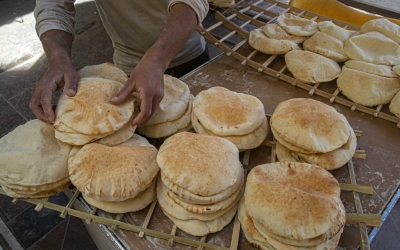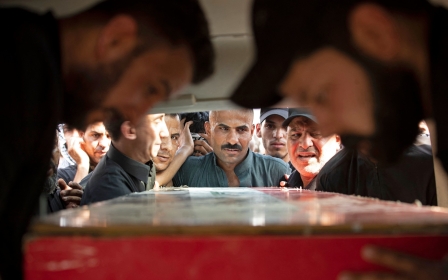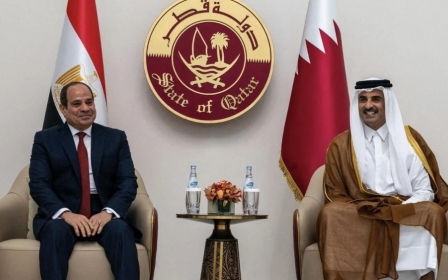Arabic press review: Jordan tells Israel to stop 'violations' at Al-Aqsa Mosque

Jordan tells Israel to stop 'violations' at Al-Aqsa
Jordan has called on Israel to “immediately stop its violations against Al-Aqsa Mosque” and has condemned the police protection given to hardliners to carry out incursions into the compound.
A statement issued by Jordanian foreign ministry spokesperson Sinan al-Majali said that “the continuing and escalated unacceptable provocative practices against the holy Al-Aqsa Mosque and the accompanying provocative practices... are a flagrant and unacceptable violation of international law, the historical and legal status quo in Jerusalem and its sanctities,” according to official news site Petra.
“The continuous violations and attacks against the holy sites in conjunction with the continuous Israeli storming of the occupied Palestinian territories threaten further escalation and represent a dangerous path that must be immediately cut,” al-Majali said.
Food crisis in Egypt expected
New MEE newsletter: Jerusalem Dispatch
Sign up to get the latest insights and analysis on Israel-Palestine, alongside Turkey Unpacked and other MEE newsletters
There is increasing fear over a food crisis in Egypt that may lead to famine, according to a report published by the Arabi21 website.
Food prices have risen to unprecedented levels, amid fears of a stock decline and a shortage of supply in many strategic commodities.
Egypt has a population of over 104 million - the largest in the Arab world - and its poverty rate has reached about 30 percent, according to Arabi21.
The prices of many strategic foodstuffs, such as wheat, fodder, vegetable oils and sugar, have significantly increased due to the decline in stocks after import restrictions and the inability of the Central Bank of Egypt to secure foreign currency in banks for importers.
Data issued by the Central Agency for Public Mobilization and Statistics in Egypt indicated that annual consumer price inflation in cities had reached its highest level in nearly four years.
In June, Egyptian Minister of Finance Mohamed Maait said he feared the continued increase in the price of food and commodities could lead to "famines".
Abdel-Tawab Barakat, a former government adviser, said that the "Egyptian people have been suffering for years from a food crisis and a lack of self-sufficiency in several commodities, but it has become like a snowball that grows day after day."
Speaking to Arabi21, Barakat explained that “the crisis extends to food commodities in which the state achieves a high rate of self-sufficiency, such as rice, where its price surged by more than 100 percent, from six pounds last year to 15 pounds."
Barakat also warned “of the continued decline in wheat stocks in the private sector, which prompted bakeries to increase bread prices and reduce the size of loaves".
He said the main cause of the crisis “is not the repercussions of the Covid-19 pandemic or the Russian-Ukrainian war, but rather the state's negligence when it comes to planning for self-sufficiency in strategic food commodities such as grains, vegetable oils and meat, while focusing on huge projects that have nothing to do with protecting Egyptians from the repercussions of pandemics and wars”.
100 Egyptians awaiting execution
A human rights organisation has confirmed that 100 Egyptians are on death row after their final verdicts were issued.
El Shehab Center for Human Rights (SHR) issued a statement on the 20th anniversary of the World Day Against the Death Penalty, calling on Egyptian authorities to halt the implementation of death sentences and accord with international covenants to ensure fair trials.
“The death penalty has now become the systematic regime’s method against its opponents. Actual legislative, judicial and executive practices constitute a grave danger, and a clear violation of all international covenants ratified by Egypt,” the statement, as reported by Al-Quds al-Arabi, read.
The SHR continued: “Most of the political cases in which the death penalty was issued in Egypt, whether executed or those pending execution, were void of all fair trial standards.”
Iraqi bank scam costs $800m
The Iraqi parliament's Commission of Integrity has revealed the theft of about $800m from government accounts in the Rafidain Governmental Bank, and announced the opening of an extensive investigation into the case, according to a report published by Al-Araby al-Jadeed.
Committee member Ahmed Taha al-Rubaie confirmed that the funds were stolen from the accounts of the General Commission for Taxes at Rafidain.
Rubaie said the finance ministry had formed a committee to investigate the matter, and pointed out that “the loss of these huge amounts from the account of the General Commission for Taxes took place during the term of figures whose positions were changed, and they are waiting for the judicial investigation”.
So far, the government of Prime Minister Mustafa Al-Kadhimi has not commented on the issue. Sources in the finance ministry told Al-Araby al-Jadeed that “the persons involved in this case are affiliated with the party of the former prime minister, Nouri al-Maliki”.
Taher al-Janabi, an economics researcher, said that corruption in the Iraqi state could be described as organised because there are influential parties that no authority can hold accountable at the moment.
Middle East Eye delivers independent and unrivalled coverage and analysis of the Middle East, North Africa and beyond. To learn more about republishing this content and the associated fees, please fill out this form. More about MEE can be found here.





